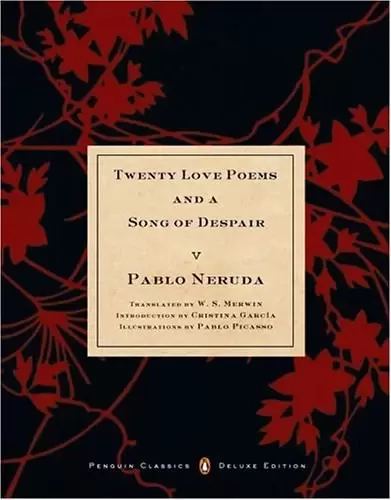
作者:PabloNeruda
出版社:PenguinClassics
副标题:(Dual-LanguagePenguinClassicsDeluxeEdition)(SpanishandEnglishEdition)
原作名:Veintepoemasdeamoryunacancióndesesperada
译者:W.S.Merwin
出版年:2003-12-02
页数:112
定价:USD14.00
装帧:Paperback
丛书:PenguinClassicsDeluxeEditions
ISBN:9780142437704
内容简介
······
First published in 1924, Veinte poemas de amor y una canción desesperada remains among Pablo Neruda’s most popular work. Daringly metaphorical and sensuous, this collection juxtaposes youthful passion with the desolation of grief. Drawn from the poet’s most intimate and personal associations, the poems combine eroticism and the natural world with the influence of expressionism and the genius of a master poet. This edition features the newly corrected original Spanish text, with masterly English translations by award-winning poet W. S. Merwin on facing pages.
Includes twelve sketches by Pablo Picasso
New introduction by Cristina García
A Penguin Classics Deluxe Edition pacjaged with French flaps
作者简介
······
Pablo Neruda was the pen name and, later, legal name of the Chilean writer and politician Neftalí Ricardo Reyes Basoalto. Neruda assumed his pen name as a teenager, partly because it was in vogue, partly to hide his poetry from his father, a rigid man who wanted his son to have a "practical" occupation. Neruda's pen name was derived from Czech writer and poet Jan Neruda; Pablo is thought to be from Paul Verlaine. With his works translated into many languages, Pablo Neruda is considered one of the greatest and most influential poets of the 20th century.
Neruda was accomplished in a variety of styles ranging from erotically charged love poems like his collection Twenty Poems of Love and a Song of Despair, surrealist poems, historical epics, and overtly political manifestos. In 1971 Neruda won the Nobel Prize for Literature, a controversial award because of his political activism. Colombian novelist Gabriel García Márquez once called him "the greatest poet of the 20th century in any language."
On July 15, 1945, at Pacaembu Stadium in São Paulo, Brazil, he read to 100,000 people in honor of Communist revolutionary leader Luís Carlos Prestes. When Neruda returned to Chile after his Nobel Prize acceptance speech, Salvador Allende invited him to read at the Estadio Nacional before 70,000 people.
During his lifetime, Neruda occupied many diplomatic posts and served a stint as a senator for the Chilean Communist Party. When Conservative Chilean President González Videla outlawed communism in Chile, a warrant was issued for Neruda's arrest. Friends hid him for months in a house basement in the Chilean port of Valparaíso. Later, Neruda escaped into exile through a mountain pass near Maihue Lake into Argentina. Years later, Neruda was a close collaborator to socialist President Salvador Allende.
Neruda was hospitalized with cancer at the time of the Chilean coup d'état led by Augusto Pinochet. Three days after being hospitalized, Neruda died of heart failure. Already a legend in life, Neruda's death reverberated around the world. Pinochet had denied permission to transform Neruda's funeral into a public event. However, thousands of grieving Chileans disobeyed the curfew and crowded the streets. Neruda's funeral became the first public protest against the Chilean military dictatorship.
目录
······
Introduction
I. Body of a Woman
II. The Light Wraps You
III. Ah Vastness of Pines
IV. The Morning Is Full
V. So that You Will Hear Me
VI. I Remember You As You Were
VII. Leaning into the Afternoons
VIII. White Bee IX. Drunk with Pines
X. We Have Lost Even
XI. Almost out of the Sky
XII. Your Breast Is Enough
XIII. I Have Gone Marking
XIV. Every Day You Play
XV. I Like for You to Be Still
XVI. In My Sky at Twilight
XVII. Thinking, Tangling Shadows
XVIII. Here I Love You
XIX. Girl Lithe and Tawny
XX. Tonight I Can Write
The Song of Despair
Selected Bibliography
Suggestions for Further Reading
评论 ······
It is the hour of departure, the hard cold hour
二十首情詩,和一首絕望的歌。如其名,前面二十篇過於優美絢爛,以致最後的突轉令人猝不及防。看完之後很難過,還是第一次被詩歌影響得這麼深。
高中時候特別喜歡的Neruda到大三再讀居然會覺得有些膩
很黄但很优美。
评论前必须登录!
注册